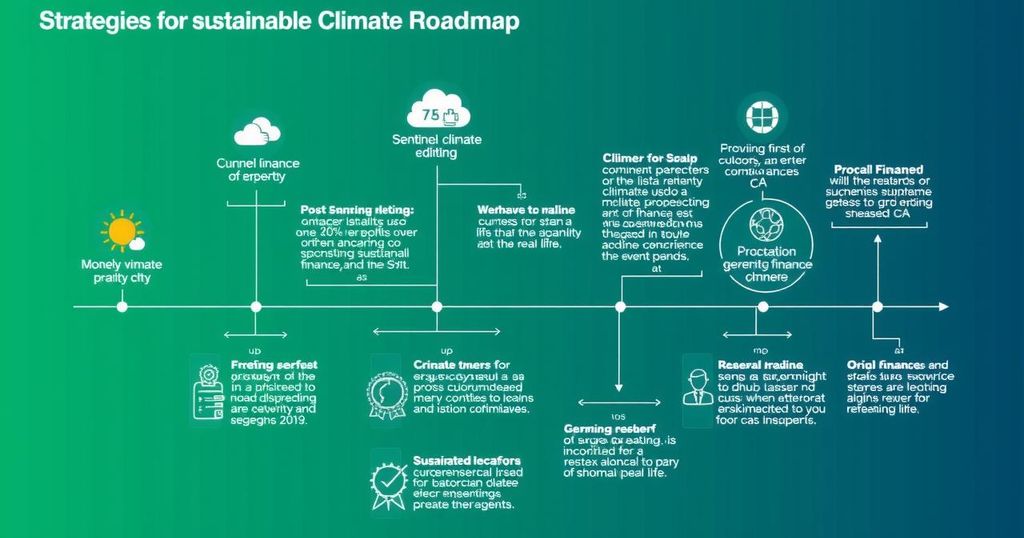COP29’s outcomes exposed major shortcomings in climate finance agreements, with developed nations pledging $300 billion by 2035 while developing countries require $1.3 trillion annually. EMDEs call for more substantial support and the absence of binding commitments raises questions of equity. Although steps toward a global carbon market were made, the urgency for effective funding and transparency remains paramount as COP30 approaches.
The 29th Conference of Parties (COP29), which concluded on November 24, was marked by significant contention surrounding climate finance, ultimately leading to what many have characterized as a missed opportunity. The lack of trust between the Global North and South remains evident, as developing nations express dissatisfaction with the commitments made by developed countries. Despite previously pledging to mobilize $100 billion annually for climate support, the commitment to a new target of $300 billion by 2035 falls considerably short of the estimated $1.3 trillion required annually to address climate challenges effectively.
Emerging Markets and Developing Economies (EMDEs) assert that to fulfill their Nationally Determined Contributions (NDCs), they require up to $5.9 trillion, alongside a need for annual adaptation finance of $215-387 billion until 2030. The Baku declaration, although referencing $1.3 trillion, lacks binding obligations for developed nations, leaving developing countries without a secure financial framework. The principle of Common But Differentiated Responsibility (CBDR), which asserts that historically higher-emitting countries should lead in climate finance, is notably absent from the discussion, raising equity concerns.
There were, however, positive strides at COP29, including the establishment of a global carbon market aimed at enhancing international collaboration on emission reductions. Although some countries set ambitious new NDC targets, doubts persist regarding their ability to realize such goals without necessary financial support. With COP30 set to take place in Brazil, it is crucial that discussions shift towards establishing mechanisms for effective climate finance distribution, including consideration of innovative funding sources and ensuring transparency in data collection.
In conclusion, the outcomes from COP29 illustrate significant challenges regarding climate finance, underscoring the necessity for developed nations to fulfill their financial pledges and rethink timelines. The urgency is palpable, as the effects of climate change continue to intensify globally, and the window for decisive action is narrowing. A collaborative approach towards technology sharing and concessional funding is essential to mitigate global temperature rise effectively.
Vibhuti Garg, Director South Asia at the Institute for Energy Economics and Financial Analysis, articulates a pressing demand for accountability and action from developed countries, indicating that “the world cannot afford another missed opportunity.”
The 29th Conference of Parties (COP29) aimed to address climate change issues, particularly climate finance. This year’s discussions underscored the growing divide between developed and developing countries, which has been a continuing theme in negotiations since COP15 in 2009 when developed nations committed to mobilizing $100 billion annually to aid developing countries. However, the financial commitments have consistently fallen short of the actual needs, leading to concerns about equity and responsibility in contributing to climate action. The concept of Common But Differentiated Responsibility (CBDR) plays a crucial role in these discussions, as it acknowledges the differing capabilities and historical responsibilities of countries regarding climate change. The importance of establishing a clear framework for financial support became increasingly apparent as nations consider ambitious new climate targets against a backdrop of inadequate funding commitments.
In summary, COP29 highlighted persistent challenges in climate finance negotiations, revealing significant gaps between the needs of developing nations and the commitments made by developed countries. The absence of binding financial obligations raises serious concerns about fairness and accountability in climate action. As the world looks ahead to COP30, the necessity for innovative financing mechanisms, enhanced collaboration, and accountability in fulfilling pledges becomes critical to effectively addressing the escalating impacts of climate change.
Original Source: www.outlookbusiness.com






